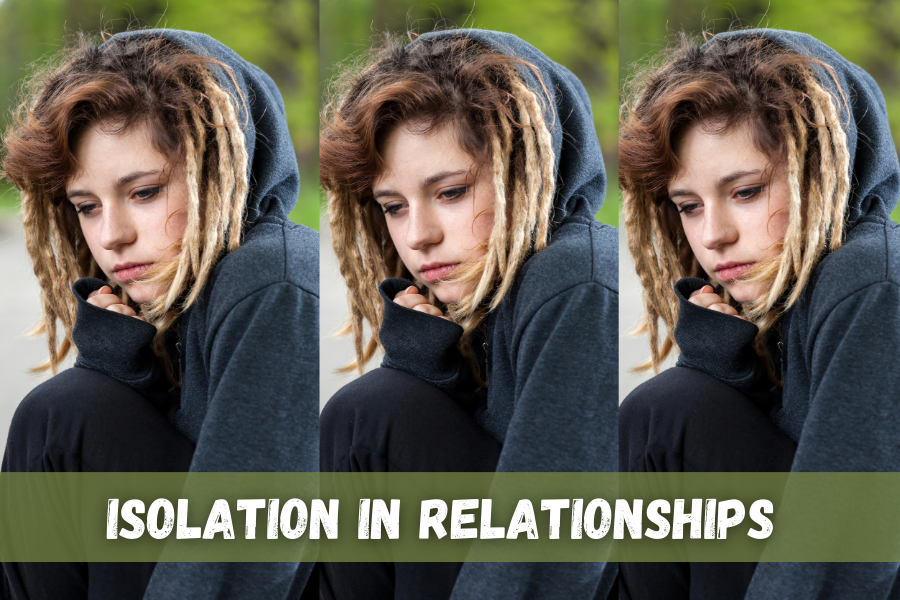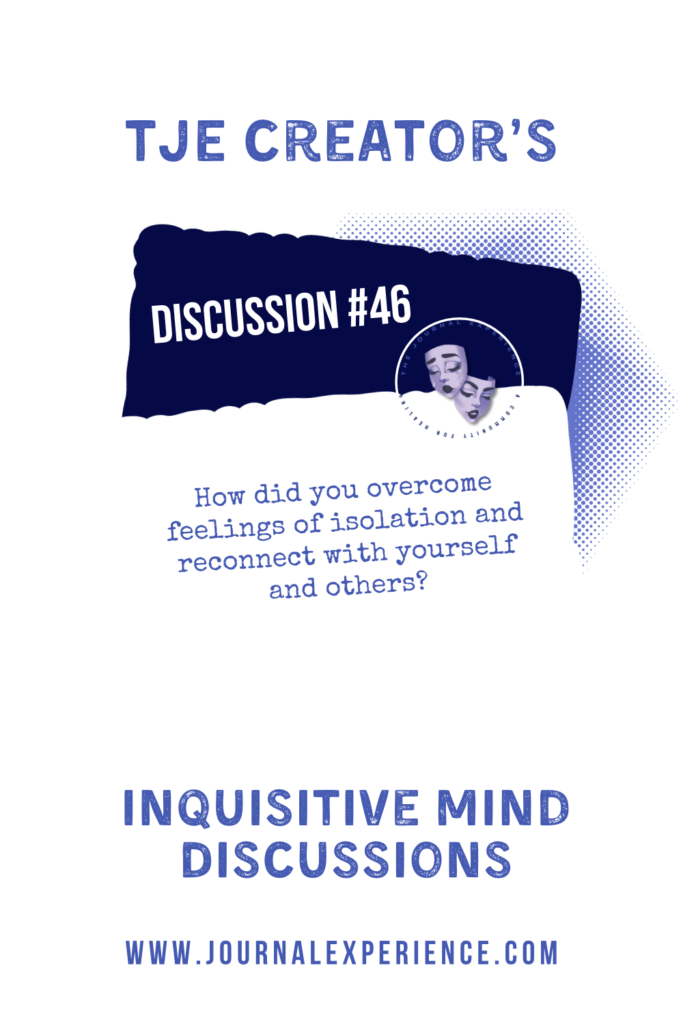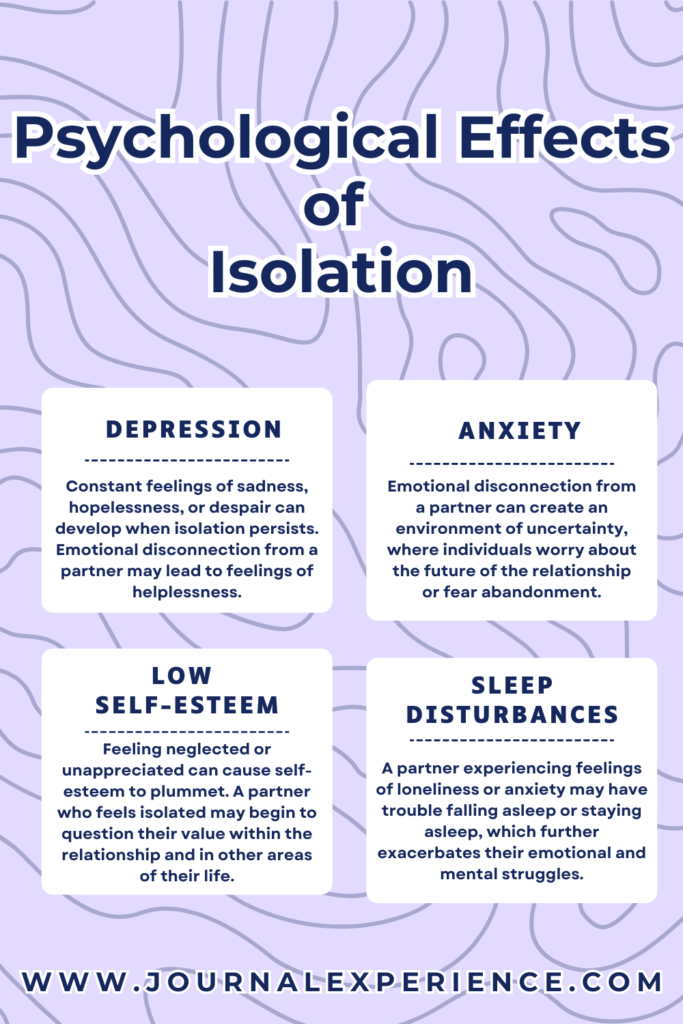Isolation in relationships can be one of the most emotionally devastating experiences. Often, it sneaks into the dynamics of a partnership, gradually building until individuals feel more like strangers than lovers.

This form of isolation doesn’t necessarily mean physical separation; it’s primarily about emotional disconnection. Even when two people share the same physical space, feelings of loneliness, lack of support, and misunderstanding can permeate the relationship, leaving both partners feeling emotionally abandoned.
This emotional divide can have far-reaching impacts, not only on the relationship but also on personal well-being, mental health, work performance, and even friendships.
Understanding the root causes of isolation in relationships is essential to address the issue effectively. Emotional disconnects can stem from communication breakdowns, personal stress, or external factors.
Whether it involves improving communication, strengthening emotional bonds, or supporting children affected by family tensions, recognizing and addressing isolation early is key to building healthier relationships.
Common Causes of Isolation in Relationships
Isolation in relationships doesn’t happen overnight. It gradually builds as emotional gaps widen due to various factors. Understanding what leads to isolation is crucial for tackling the problem before it deepens.
Lack of Shared Interests
When couples don’t share similar interests or activities, it can create an emotional rift. Over time, partners may begin to lead separate lives, pursuing different hobbies or social circles.
This can result in spending less time together, deepening the feeling of disconnection. For example, if one partner enjoys social outings while the other prefers staying home, this can limit opportunities for shared experiences, which are vital for emotional bonding.
Communication Breakdown
Effective communication is the backbone of any relationship. When communication deteriorates, misunderstandings and unresolved issues can fester, leading to emotional distance.
Instead of addressing problems head-on, couples might avoid tough conversations, which further contributes to a sense of neglect and isolation.
Poor communication also means that emotional needs may go unmet, fueling feelings of loneliness.
External Stressors
Life events like job loss, illness, financial problems, or the pressures of raising children can significantly strain relationships.
External stressors often leave little room for emotional connection, as both partners become consumed by individual worries or responsibilities.
The constant focus on external challenges can push emotional intimacy to the background, creating emotional distance.
Toxic Relationship Dynamics
Toxic patterns such as power imbalances, control issues, or emotional manipulation (e.g., gaslighting) can greatly contribute to isolation.
In such cases, one partner may feel trapped or emotionally drained. This sense of emotional disempowerment fosters isolation, as the affected partner may feel they cannot express their needs or concerns openly.

Signs of Isolation in Relationships
Recognizing the warning signs of isolation is the first step toward healing.
While emotional isolation may not be immediately obvious, certain behaviors can indicate that a relationship is suffering from a lack of emotional closeness.
Limited Social Interaction
When individuals start withdrawing from friends and family, it could be a sign of isolation within the relationship.
Social withdrawal may stem from feelings of embarrassment, exhaustion, or a lack of emotional energy.
Partners who once enjoyed shared social experiences may now prefer to spend time alone or limit interactions with others.
Feeling Disconnected from Your Partner
Emotional distance is one of the most apparent signs of isolation. This disconnection may manifest as reduced physical affection, lack of meaningful conversations, or a growing sense of disinterest.
Over time, these patterns can become routine, deepening the emotional chasm between partners.
Lack of Emotional Support
Isolation often leads to a sense of emotional neglect. When one partner feels unsupported in times of stress or hardship, it signals a breakdown in the emotional connection.
A partner might feel they cannot rely on the other for comfort, which can erode trust and deepen feelings of loneliness.
Avoiding Difficult Conversations
Another common sign of isolation is the avoidance of difficult or uncomfortable conversations. Couples may opt for silence rather than addressing problems, hoping that the issues will resolve themselves.
However, avoiding these conversations only exacerbates the problem, as feelings of frustration or misunderstanding go unaddressed.
Spending Time Apart without Missing Each Other
When partners spend increasing amounts of time apart—whether due to work, hobbies, or other commitments—without feeling the absence of the other, it could indicate that emotional closeness has diminished.
A lack of desire to reconnect after time apart can be a red flag of growing isolation.
The Psychological Effects of Isolation
The emotional toll of feeling isolated in a relationship can be severe. It often leads to mental health challenges, which can, in turn, exacerbate the sense of loneliness and further strain the relationship.
Depression
Constant feelings of sadness, hopelessness, or despair can develop when isolation persists.
Emotional disconnection from a partner may lead to feelings of helplessness, as the individual feels that the situation is unlikely to improve.
Over time, this can trigger or worsen depression.
Anxiety
Isolation can also provoke anxiety. Emotional disconnection from a partner can create an environment of uncertainty, where individuals worry about the future of the relationship or fear abandonment.
Anxiety may manifest as obsessive worry, nervousness, or avoidance behaviors.
Low Self-Esteem
Feeling neglected or unappreciated can cause self-esteem to plummet. A partner who feels isolated may begin to question their value within the relationship and in other areas of their life.
This diminished sense of self-worth can create a vicious cycle, where the person becomes more withdrawn and less confident in their ability to engage in the relationship.
If emotional disconnection has eroded your sense of self, the Healing The Inner Trauma Child (HITCH) Method offers a guided path to rebuild emotional safety, self-worth, and inner resilience.
Sleep Disturbances
Emotional stress and isolation can also impact physical health, particularly sleep.
A partner experiencing feelings of loneliness or anxiety may have trouble falling asleep or staying asleep, which further exacerbates their emotional and mental struggles.
Overcoming Isolation in Relationships
Though isolation in relationships can feel overwhelming, it is possible to bridge the emotional divide with effort, mutual understanding, and support.
Here are several strategies for overcoming isolation and rebuilding emotional closeness.
Open Communication with Your Partner
Honest communication is the foundation of any healthy relationship. Partners must learn to express their feelings, fears, and frustrations openly without fear of judgment.
Opening up about feelings of isolation or loneliness can pave the way for deeper conversations that lead to meaningful change.
Building a Support Network
Relying solely on a partner for emotional support can sometimes create added pressure.
Expanding your emotional support network by engaging with friends, family, or support groups can create a more balanced and fulfilling emotional landscape.
This network provides diverse perspectives and encouragement during difficult times.
Engage in Shared Activities
Finding common interests or trying new activities together can reignite emotional closeness.
Whether it’s cooking a meal together, going for walks, or pursuing a shared hobby, spending quality time with your partner can rekindle emotional bonds and create opportunities for connection.
Couples Therapy or Individual Counseling
Sometimes, professional intervention is necessary to help navigate emotional disconnection. Therapy offers tools to improve communication and provide neutral space to discuss sensitive topics.
Couples therapy, in particular, can help both partners feel heard and understood, offering a roadmap to healing.

Ready to break free from patterns of emotional distance and reclaim your voice? The Codependency Therapy | Self Love Recovery Treatment Program provides step-by-step strategies to heal past emotional injuries and build healthier, closer relationships.
Recognizing Isolation in Children
Isolation within relationships doesn’t just affect the adults involved. Children can be deeply affected by their parents’ emotional disconnect, which can have long-term consequences for their development and well-being.
Withdrawal from Social Activities
Children often internalize tension or emotional isolation between their parents, which can manifest as withdrawal from social activities or reluctance to engage with peers.
If a child begins to withdraw from playing with friends or participating in group activities, it may be a sign of isolation within the family dynamic.
Difficulty Expressing Emotions
Just as adults struggle to communicate feelings of isolation, children may find it challenging to express themselves when they feel emotionally abandoned.
Emotional distance between parents can create an environment where children feel unsafe or unsure about sharing their own feelings.
Early recognition of emotional isolation can prevent generational trauma. The Webinar: Origins of Codependency and Pathological Narcissism sheds light on how emotional disconnection shapes future relationships—and how the cycle can be broken.
Academic Struggles
Emotional stress within the family can affect a child’s academic performance.
Children facing isolation or emotional tension at home may struggle to concentrate, lose motivation, or become anxious about schoolwork.
Additional Tips for Overcoming Isolation
Here are a few additional strategies for combating isolation and fostering healthier, more connected relationships:
Practice Active Listening
During conversations, focus on listening to your partner without interrupting. This promotes empathy and understanding, reducing misunderstandings and emotional distance.
Set Regular Check-Ins
Establishing routine check-ins with your partner can help prevent issues from spiraling. Discuss how both of you feel, address any concerns, and acknowledge each other’s emotional needs regularly.
Establish Boundaries
Setting healthy boundaries ensures that both partners have space to maintain their individuality while fostering emotional intimacy.
Discuss and respect each other’s emotional limits and personal time.
Overview
Isolation in relationships can take a significant toll on emotional and mental well-being. However, it is not an insurmountable issue.
By recognizing the signs early, addressing the root causes, and prioritizing open communication, partners can overcome feelings of loneliness and rebuild emotional closeness.
Whether it involves supporting a struggling child or seeking professional help, taking proactive steps to address isolation can pave the way toward a healthier, more fulfilling relationship.
Engaging in activities that foster connection, building a support network, and maintaining honest communication can all contribute to stronger, more resilient bonds.

Subscribe to our newsletter and become a member to gain access to valuable resources, expert advice, and support. Together, we can foster a place where respect is mutually valued and celebrated in all relationships. Let’s build a brighter, more respectful future, one connection at a time.